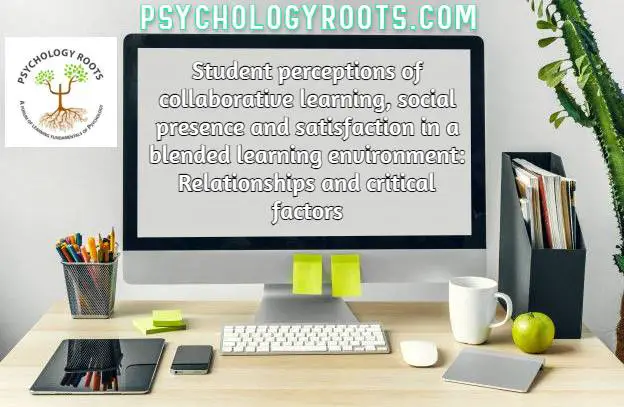Table of Contents
Student perceptions of collaborative learning, social presence and satisfaction in a blended learning environment: Relationships and critical factors
Here in this post, we are sharing the article on “Student perceptions of collaborative learning, social presence and satisfaction in a blended learning environment: Relationships and critical factors”. You can read the abstract of the article with a download link. We have thousands of articles in our collection (See articles). You can demand us any article related to psychology through our community, and we will provide you within a short time. Keep visiting Psychology Roots.
About Student perceptions of collaborative learning, social presence and satisfaction in a blended learning environment: Relationships and critical factors
The purpose of this study was to examine the relationships of the students’ perceived levels of collaborative learning, social presence, and overall satisfaction in a blended learning environment. This research studied the relationship between these three variables and identified critical factors related to them. The participants were 48 graduate students who took a blended-format course in health education and worked on a collaborative group project related to the development of a comprehensive HIV-AIDS prevention plan.

Student perceptions of collaborative learning, social presence and satisfaction in a blended learning environment: Relationships and critical factors
Data was collected from the Student Perception Questionnaire and face-to-face interviews. The analysis of quantitative data indicated that student perceptions of collaborative learning have statistically positive relationships with perceptions of social presence and satisfaction. This means that students who perceived high levels of collaborative learning tended to be more satisfied with their distance course than those who perceived low levels of collaborative learning. Similarly, students with high perceptions of collaborative learning perceived high levels of social presence as well.
Surprisingly, the relationship between social presence and overall satisfaction was positive but not statistically significant. Interview data revealed that (a) course structure, (b) emotional support, and (c) communication medium were critical factors associated with student perceptions of collaborative learning, social presence, and satisfaction. Explanations about findings and implications for instructional design are discussed in the conclusion
Authors of Student perceptions of collaborative learning, social presence and satisfaction in a blended learning environment: Relationships and critical factors
- Hyo-Jeong So
- Thomas A. Brush
Avail Article [sociallocker id=64051]
[/sociallocker]
Need Any Other Article:
Are you looking for any other article? Don’t Worry, We provide you free and quickly. Just need to create a query in our community.
Information:
The purpose of our website is only to help students to assist them in finding the best suitable instrument for their research especially in Pakistan where students waste a lot of time in search of the instruments. It is totally free of cost and only for creating awareness and assisting students and researchers for good researches. Moreover, it is necessary for you to take the permission of scales from their representative authors before use because copyrights are reserved by the respected authors.
Help Us Improve This Article
Did you find an inaccuracy? We work hard to provide accurate and scientifically reliable information. If you have found an error of any kind, please let us know.
Add comment. we appropriate your effort.
If you have any scale or any material related to psychology kindly share it with us at psychologyroots@gmail.com. We help others on behalf of you.
Follow